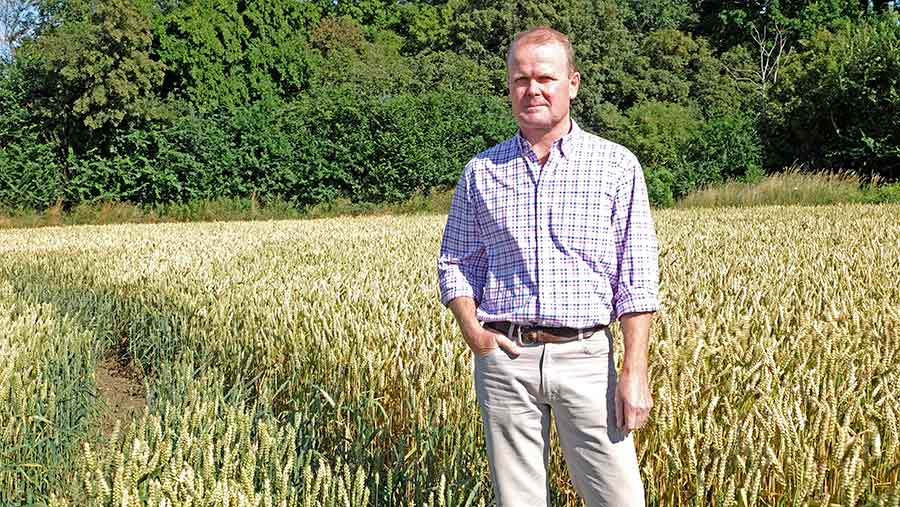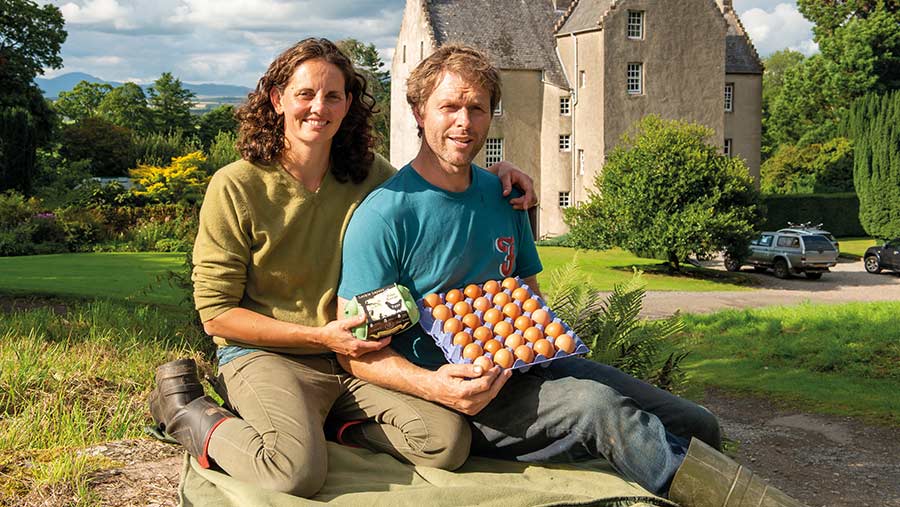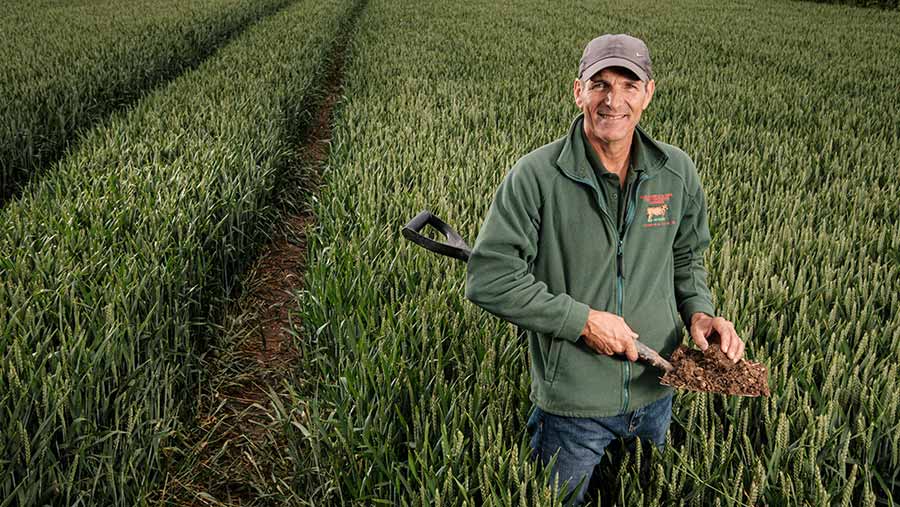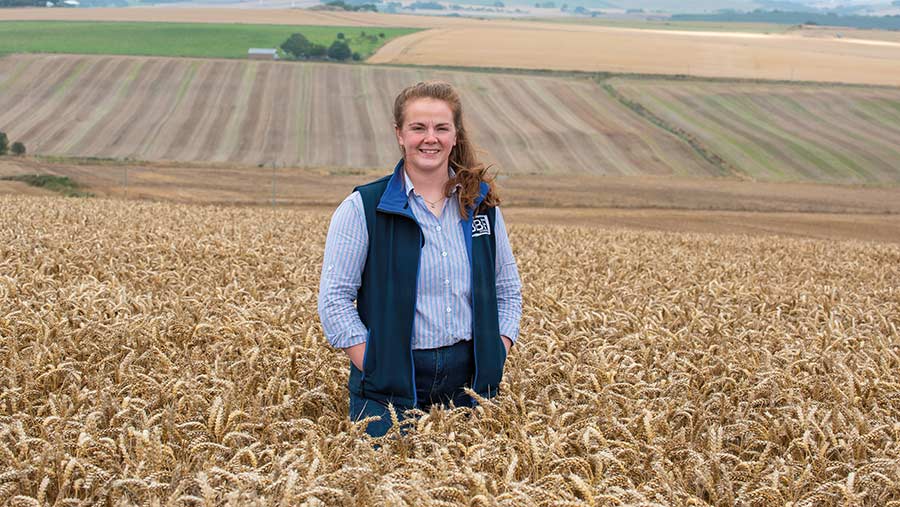FW Awards 2021 winners share their plans for the new year
Reflecting on the year gone by and considering how to improve things for the next 12 months can be a useful process for any business.
Last year had its share of changes and challenges, with farmers reminded that being flexible and able to think on their feet remain key skills.
Now is the time to evaluate the successes and misses and look ahead, and take the opportunity to start afresh.
Farmers Weekly spoke to a selection of the newest award winners about their 2021 experiences, plans for 2022, and advice for others.
See also: Policy, prices and weather – how farmers felt about 2021

Edward Vipond © Jason Bye
Edward Vipond – Farmer of the Year and Farm Manager of the Year
Arable farmer, Suffolk
How do you feel 2021 went for farming and your business?
Last year had its highlights and lowlights, including the continuing Covid-19 pandemic and, as always, the weather played its part throughout.
I firmly believe that farming is experiencing a renaissance, with more people positively portraying the farming industry than ever before, such as Clarkson’s Farm and My Yorkshire Farm.
We must take advantage of this and promote the UK agricultural industry whenever possible.
For the first time in three years, we had a great autumn drilling campaign and I feel my battle with blackgrass has been a successful one – for now, anyway. My sunflower crop lacked one vital ingredient – the sun – and performed poorly, but I will persevere with the crop, which I believe works for me.
What are your plans and goals for 2022?
I have various goals, one of which is to start the Sustainable Farming Incentive pilot and see how it integrates into part of the farm I manage.
Another is to develop the sunflower crop’s growing, agronomy and marketing potential.
More immediately, securing the rest of my nitrogen requirement is fairly high on the list, along with some key active ingredients for my wheat and rye crops.
Is there anything new or different you’d like to try next year?
I will use a different drill for my sugar beet crop in 2022 in an effort to optimise germination and plant stand, and will establish two-year legume mixes for the first time to remove small fields and awkward corners to improve machine efficiency.
I would like to improve links and communication with the local primary schools to educate the next generation about agriculture, as well as try to take more time off. I’m the worst at taking holiday, but we all need time away from the businesses we run.
What advice do you have for other farmers?
The degression of the Basic Payment Scheme as we know it until 2028 is a major change in farming policy.
The level of support for many will decrease significantly, but less so for others, depending on the format and payment rates of the long-awaited Environmental Land Management (ELM) scheme.
It is critical that farmers engage with Defra to fully understand these schemes, how they best fit their farms and how to maximise the environmental benefit on their holdings.
One statistic that is very worrying is the fatalities in agriculture. Please stay safe and ensure you are not putting yourself or anyone else at risk.
Any final message for our readers?
May I take this opportunity to wish all Farmers Weekly readers a very happy 2022.

Alison and Fergus Younger © Angus Findlay
Alison and Fergus Younger – Diversification Farmers of the Year
Livestock farmers, Stirlingshire
How do you feel 2021 went for farming and your business?
In some ways 2021 has been a good year – topping off the Farmers Weekly award were high market prices for sheep and cattle, an inspiring Scottish agritourism conference, and Covid-related changes to travel have made our farm stay accommodation really busy.
The launch of the online shop for our home delivery and farm produce was also a highlight – it’s a great improvement on our previous order system and has driven an increase in meat sales.
We had some challenges in the summer with the supply chains for our meat, when our existing local butcher had to realign his own business.
We run a very lean system that is reliant on working in partnership with local butchers, so we had to build a new partnership, then fit all the jigsaw pieces back together.
In Scotland, the abattoir network for private kills has fewer local facilities available. It’s not just the abattoirs that make the supply chain vulnerable – refrigerated transporters are hard to find. We finally found a solution, but it’s far from perfect and more costly.
Clarkson’s Farm has been excellent for farming, and also finally allowed Alison’s family to understand why we can’t always commit to (or attend) family occasions – even after 20 years of us trying to explain, They now realise it’s not that we don’t like them!
What are your plans and goals for 2022?
In 2022 we will focus on growing our meat sales through the online shop, finishing the off-grid bothy to extend our on-farm accommodation and maximising our grass output with negligible fertiliser.
We are conscious that post-Brexit Scottish government support for farming remains unknown, and we need to plan as best we can for a range of potential outcomes.
The weight of anti-farming pressure groups and those who want some form of control over your land can be overwhelming at times.
We are therefore making a conscious effort to be on the front foot to tell our positive narrative and not be bullied.
We should soon finalise our farm environmental statement and a flexible five-year plan for responding to the ongoing uncertainty.
Is there anything new or different you’d like to try next year?
Our five-year plan involves elements of both further diversification and a change to our farming approach.
On the income side we are currently negotiating with a number of travel trade operators for a 2023 programme that we hope will allow us to invest and plan for a five-star farm tasting tour package.
We have planted our first commercial crop of garlic to add to our local food range, so we are keeping our fingers crossed for a successful harvest.
We are also excited to be developing an agri-forestry proposal with a neighbouring estate.
Although the focus will be on where we want to be in five years, we will also have to be mindful that neither us nor the kids are getting any younger. Decisions taken now will need to be set against the context of the beginnings of a succession plan and investment approach towards this.
What advice do you have for other farmers?
As a husband-and-wife team, we can find it hard to do the strategic planning while being busy with getting on with the job and juggling day-to-day family activities.
Bringing in an external person can help to step back, look at the bigger picture and leave some of that baggage at the door.
Similarly, collaborating with neighbours is often rewarding and fun – there is truth in the saying a problem shared is a problem halved.
While we have a really beautiful farm, we have a nearby spot that is quick and easy to get to, lets us walk the dogs and swim in the river with the kids. It’s a great way for us all to feel we can be off farm without having to go too far, and it’s a firm family favourite.
Any final message for our readers?
Bliadhna Mhath Ur. Lang may yer lum reek!

Paul Temple © Jim Varney
Paul Temple – Mixed Farmer of the Year
Beef and arable farmer, East Yorkshire
How do you feel 2021 went for farming and your business?
We started off submerged in the restrictions, and we had an awkward winter that was hard work.
That was followed by a dry, cold early spring, which meant by the time we got to the end of March, there wasn’t a great deal of optimism in me.
Then, as is always the case, the weather twisted and turned, and we were fortunate to go from thinking we might not have enough silage or straw to ending up with plenty.
The crops weren’t record-breakers, but achieved useful averages, and the market exceeded all our expectations and proved to me the fragility and volatility that farming faces.
The upside is that having seen global harvests for the past several years exceed consumption, we are now in the opposite position.
That doesn’t take away the issues we all have with fertiliser. We’re just about to start the world’s biggest fertiliser experiment, where every farmer is looking to cut back on their nitrogen use, so we will see how dependent the world is on nitrogen for crop production.
When you put yourself forward for a farming award, it challenges you to think about what you’re doing, why you’re doing it and what is most important.
Just to be go to the awards as finalists was fantastic, because we had a great time, and for many of us it was the first time we’d been to a large social event in a while.
It felt good to be back with people, and I realised the value of it. Winning the award was the icing on the cake.
Meeting face to face – whether it’s a daytime meeting, sharing a lunch or an evening meal together – rounds your understanding of people in a way you can’t get in the virtual world.
What are your plans and goals for 2022?
I think next year will be quite a testing one for a lot of people because of the rise in input prices.
I will revisit whether we can market things in a different way. That has gone well this year, but I will see if there are any opportunities off the back of people’s growing appreciation of buying local.
I usually do my management accounts in January. I think they will be very different next year to anything I have done over the past 30 years, because the prospects of crops being bigger than ever before are remote, and that changes the dynamics of things.
We have to look at how we value our staff and how we can encourage their development, because I think that’s going to be very important.
Is there anything new or different you’d like to try next year?
I am concerned about the availability of nitrogen. We have three-quarters of our requirements in the tank now, but we will require some, and once you shut factories down – and many of them produce to the market – it’s very difficult for them to catch up.
I just became the director of the Global Farming Network and I am looking at doing more work connecting with farmers across the world. I am a little concerned that countries are becoming too inward-looking after Brexit, and now that six years have passed since the referendum, I think the track record of the people who led us here should be revisited with more vigour.
What advice do you have for other farmers?
We all need to up our game after Brexit with new markets and trade deals.
Farmers should look at what’s happening in the world and have more of an idea of what’s going on globally.
The opened-up world is not as much of a threat as it was 12 months ago, because food availability is genuinely tightening.
The investment cycle is going to be more difficult and that generally triggers change, so think about where you are going to be in 10 years’ time and how you will get there.
From a practical farming point of view, if you become more efficient you will automatically achieve the environmental targets and won’t have to worry about the complexities of 101 carbon calculators.
Look at your investments in the long term, and value your own labour – farmers aren’t generally good at this.
Any final message for our readers?
Give yourself time to switch off from the electronic world and give yourself a break.
If you’re fortunate enough to be able to go away on holiday, enjoy it, or, if you stay home, turn off every electronic device for two to three days. It’s amazing what a difference it makes to your ability to think and sleep.

Harriet Ross © Angus Findlay
Harriet Ross – Young Farmer of the Year
Arable and pig farmer, Aberdeenshire
How do you feel 2021 went for farming and your business?
2021 was a massive challenge. Blood, sweat and tears come to mind, with extreme ups and extreme lows.
Succession of the family business was a challenge in itself, but adding a farm purchase to the mix really added to the stress.
But although it was stressful (to say the least), it has been a very exciting year.
The highlight has got to be securing bank funding for the farm purchase. It was no easy task and I spent six months putting together budgets, cashflows and business plans.
Of course, another highlight was the Farmers Weekly Awards. Wow, what a night and what an experience!
I feel very privileged to have been shortlisted, never mind to have won. My yellow plaque now has pride of place in the farm office. It really is an award for the whole team and was a great way to celebrate.
About a week after we completed on the purchase of the pig unit, the pig sector went into the biggest crisis it has seen for a very long time.
We did realise that the pig sector was in a low before we bought the farm, but what we didn’t forecast was not getting pigs away and the monumental backlog that would follow.
I don’t think anyone can budget for that. We have a lot of overweight pigs on farm that are costing us a lot more to produce, and then we get hit with deductions at the abattoir.
We haven’t quite got through this challenge yet, but there is light at the end of the tunnel and we hope by spring things will be getting back to some sort of normal.
What are your plans and goals for 2022?
Survive the storm, and look after the team and our pigs. We are very lucky to have taken on a great team of employees and I am looking forward to developing a working relationship with each of them.
I will continue to shadow our pig manager and learn as much as I can from him.
In my previous consulting role I did a lot of work looking at carbon footprinting. I would like to look at this in a lot more detail for our pigs and see if we can find a premium for carbon-friendly produced pork.
Looking at alternative protein sources is also high on the agenda for next year.
Is there anything new or different you’d like to try next year?
It will be another year of learning and understanding the new pig enterprise, including trying to make it run as efficiently as possible when margins are tight.
What advice do you have for other farmers?
Speak about succession early and keep speaking about it. It was a stressful and awkward experience for the whole family, but hopefully now everything is sorted my mum and dad can relax and enjoy retirement.
My mum said she was very glad to have done the process now rather than in 20 years’ time when her health/brain might not have been able to cope with the decision-making process. They were both also happy to have their retirement on their own terms and be able to enjoy it.
Another tip would be to surround yourself and your business with the right people.
People are very important to us, and we talk to and work with as many different people as we possibly can, whether that be other farmers or consultants.
We were very lucky to be given the opportunity to purchase the farm privately and this was because we had a good relationship with the previous owner.
We still have a great relationship, and both [my partner] Ben and I are very grateful for the opportunity he has given us and his mentorship throughout the whole transition period.
I once heard the phrase (I think at a farmer discussion group) “don’t get too busy making a living and forget to live”.
Farming is 24/7. Therefore, it is really important to make time for yourself. I ride my horse and it helps clear the head.
It’s very hard to make the time, as I feel guilty when I am not focusing on the farm, but I feel a lot more motivated after some “me” time. I definitely don’t have this balance right yet, but it is something I am working on.
Any final message for our readers?
I can’t believe 2021 is over, it has been a rollercoaster year.
I am very grateful to my family for putting up with all the stressful discussions about how we can make this new venture work, and also to the new team at the pig farm who have all welcomed us and taught us a lot about the farm already.
Here’s to the challenges and successes 2022 will bring.
